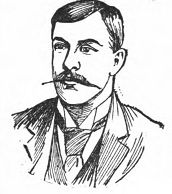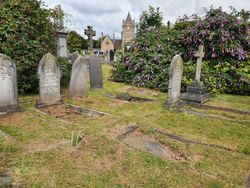Archie Goodall

Archibald Lee, "Archie" Goodall was one, with John, of perhaps the best known footballing brothers of their era, better-known even than the Maleys, with whom there are great parallels. All were sons of the military. In the Goodall's case their father was a Clackmannanshire soldier, their mother from Ayrshire, the couple marrying in Tarbolton in 1860. But the Queen's service took them to London in 1863, when and where John was born, and in 1865 to Belfast, Archie's birthplace. It meant that, whilst both played League and international football, neither was eligible for Scotland despite on the death of their father when they were young, their mother returning to Scotland, remarrying and living in Kilmarnock, the boys being brought up entirely there and learning only the Scottish game.
As the elder brother it was John who headed south first, in 1883 and aged just twenty as one of the first Scots to do so. Archie followed in 1885 at much the same age, his first English club being Stanley, later Liverpool Stanley. After two seasons at Bolton's Great Lever as the club imploded financially John had moved onto Preston North End, where in 1888, after short stays at Derby and Bolton Wanderers Archie joined him. But again it was to be brief. He spent the 1888-89 season on the fringes at Aston Villa, before finally settling down at one club. It was again Derby but with a difference. The much steadier John was by then there, he leading line with his younger brother, who to begin with had also been a forward, fitting in behind at halfback, often at Scottish centre-half, if a somewhat robust one.
Over the next fourteen seasons Archie Goodall would make 380 League appearances for The Rams, 424 in all, as John over a decade made 211. And it was in 1899, as John's career began to wind down with fourteen England caps behind him, that his brother would, on a rule change, earn his first cap, but in beating Wales for Ireland. At that point they became the first siblings to play international football for different countries.
However, the glow of victory would not last long. In the Irish team again two weeks later and against Scotland at Celtic Park the Irish were 5-0 down at half-time, 9-1 down at full-time. Yet things would improve, albeit slowly, so that by 1902 it was 1-5 against the land of his upbringing, in a team that included not just one Scot but three. Alongside Goodall Bob Milne was at left-half and William Gibson captained from left-back. And it would get better still. In 1903 Goodall was one of the group of Irish players that shared the Home Championship for the first time, in the process losing to England but defeating Scotland for the first time.
Archie Goodall would play his last international game in 1904, in victory as centre-forward against Wales. In doing so he became and remains at thirty-nine the oldest player to represent Ireland as well as being its oldest goal-scorer. By then he had left Derby and moved on to Glossop via Plymouth Argyle. Indeed he would also manage Glossop for the 1904-5 season taking it to mid-table after re-election. Then there was a last fling as a player aged forty-one at Wolves before other careers beckoned, both parallel and new.
On moving from Stanley and eventually to Derby he was recorded in 1891 as a publican, living with a Liverpool-born Sarah Duthie. She was his sister-in-law and was housekeeping. He had married her sister Mary Ann in 1889 in Liverpool but she had just died at the age of just twenty-five. In 1901 he was then recorded as a Commission Agent still in Derby and it was there in 1893 banns had called for his remarriage to Mary Jane Dallow. In fact they had been married that same year in Birmingham and two children followed, Richard in 1895 and Dorothy a year later.
The family then remained in Derby with, in 1911, Archie recorded as a music-hall artiste. Ever something of a show-man, he had entered show-business, travelling to Continental Europe and the States as a strongman. In 1913/14 he travelled to the latter and back with his children before finally returning to sing in the music-halls, settling officially in London, living through much of the 1920s with his son, Richard, named for his father, in Fortis Green between Muswell Hill and East Finchley. And it is there that he died aged sixty-five in 1929. But, suggesting his wife may still have been living in her home town with their daughter, he was not buried in London. In fact his final resting-place is in the Nottingham Road Cemetery, Derby.

Birth Locator:
Residence Locations:
1871 - 13, Glencairn Sq., Kilmarnock
1881 - 8, Gilmour St., Kilmarnock
1891 - The Plough Inn, Castle St., Derby
1901 & 1911 - 29, Wolfa St., Derby
1922 - 1929 - The Garage, 28, Southern Rd., Fortis Green, London
Death Locator:
1929 - The Garage, 28, Southern Rd., Fortis Green, London
Grave Locator:
Nottingham Road Cemetery, Derby
Back to the Irish Trail,
the Killy Trail
or the SFHG Home page